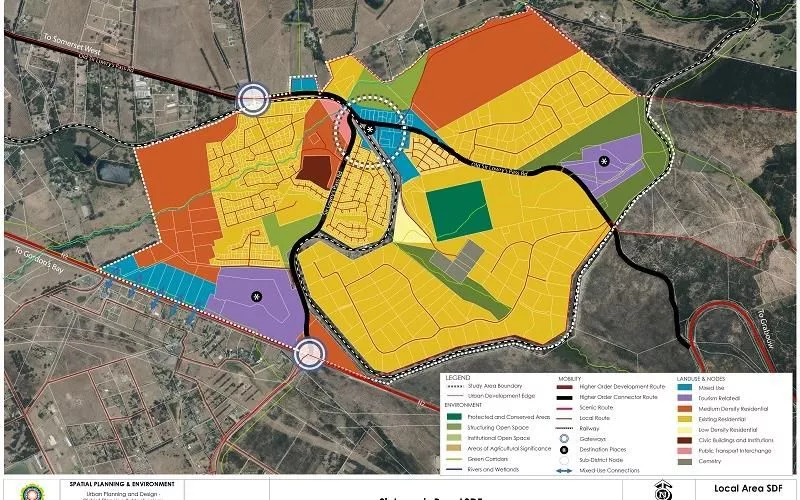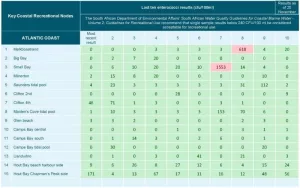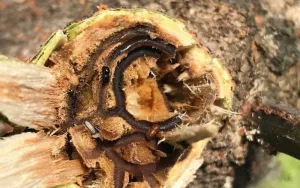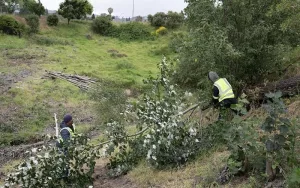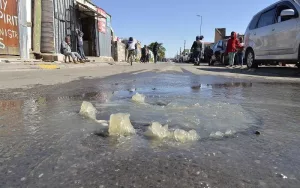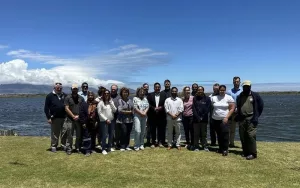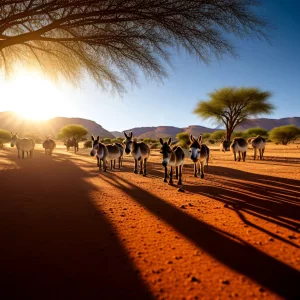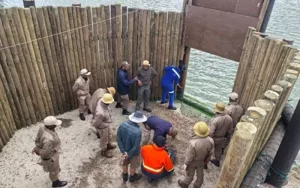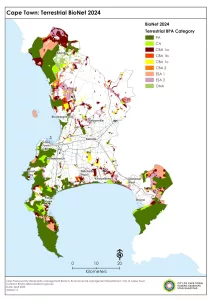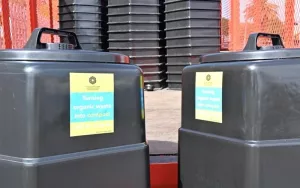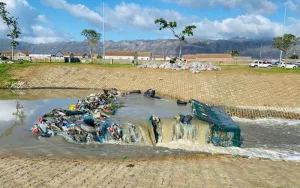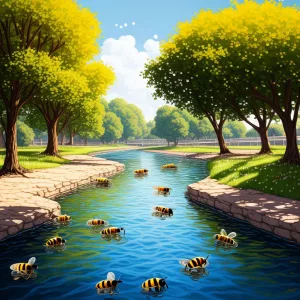Sir Lowry’s Pass Village is a beautiful blend of nature and community, nestled between stunning mountains and open fields. The draft Local Spatial Development Framework (LSDF) aims to improve the village by enhancing services, boosting the local economy, and preserving its rich cultural history. It encourages residents to get involved in shaping their future through public meetings and discussions. This plan seeks to create a lively community where people can enjoy parks, cultural sites, and new development while honoring the village’s past. Together, they can build a bright future for Sir Lowry’s Pass Village!
Cape Town’s beaches shine brightly as top summer spots, known for their breathtaking beauty and clean, clear waters. The city’s innovative “Summer Dashboard” keeps beachgoers informed about water quality, ensuring a fun and safe experience for everyone. From the lively Camps Bay to the peaceful shores of Muizenberg, each beach has its charm. Cape Town’s commitment to keeping its coastline pristine is a model for cities everywhere, showing that nature and community can thrive together.
The small but mighty Polyphagous Shot Hole Borer (PSHB) beetle is threatening the beautiful trees of Somerset West, infesting over 5,000 of them, including beloved species like Boxelder and Weeping Willow. To combat this danger, the City of Cape Town is holding a free training session on December 19, 2024, inviting residents to learn how to spot and manage the beetle’s damage. This effort is vital not just for the trees, but for preserving the community’s rich cultural history tied to these natural treasures. By joining together, Somerset West can protect its urban forests and ensure they thrive for future generations.
After a fierce storm in 2023 tore down over 200 of Stellenbosch’s famous oak trees, the community sprang into action with a powerful reforestation effort. Thousands of new oaks and native trees were planted to bring back the town’s green beauty and protect its rich heritage. This rebirth not only restores the City of Oaks’ charm but also strengthens the land against future threats, uniting people around hope, history, and a greener future.
The Elsieskraal River restoration project in South Africa is on a mission to clean up the river and bring back its natural beauty. By removing unwanted poplar trees, this initiative aims to improve water quality and help local plants and animals thrive. The project, led by the City’s Water and Sanitation Directorate, is also creating jobs for the community, making it a winwin for both nature and people. With the goal of finishing by January 2025, this effort shows how we can work together to heal our environment and enjoy it more fully.
As summer arrives in Cape Town, the city’s stunning beaches buzz with excitement from locals and visitors alike. But to keep these coastal gems beautiful, everyone must play their part. Simple actions, like throwing away trash properly and joining cleanup events, can make a huge difference. The city is also using smart technology to monitor and maintain its sewer systems, ensuring the beaches stay clean and inviting. Together, with small efforts and big hearts, Cape Town can shine brightly this festive season!
Cape Town is a beautiful city in South Africa, known for its stunning landscapes and vibrant culture. However, it faces serious environmental challenges, like polluted water and waste problems that threaten both health and nature. The city is working hard to improve its water quality and restore its rivers and wetlands, showing a strong commitment to sustainability. Programs are in place to engage the community and encourage everyone to help protect their environment. Cape Town’s journey is a powerful story of resilience and hope, as it strives to create a cleaner, healthier future.
Bergwater Farm in South Africa’s dry Karoo is home to over 200 rescued donkeys, but its future is uncertain due to legal battles and money troubles. The Karoo Donkey Sanctuary moved here hoping for safety and a fresh start, but the farm’s ownership is contested, risking eviction and harm to the animals. Amid tense court fights and looming deadlines, the donkeys remain silent witnesses to a fight about care, compassion, and survival in a harsh land. The sanctuary’s story is a powerful reminder of the fragile hope that rescue efforts bring to vulnerable creatures.
The Cape Animal Welfare Forum’s sterilisation campaign helps pets in poor Cape Town communities by giving free sterilisation to stop overpopulation and keep animals healthy. Since 2013, they have cared for nearly 18,000 cats and dogs, bringing hope and kindness to families. Volunteers and vets work with local people, building trust and teaching how to care for pets better. This quiet effort is changing hearts and neighborhoods, making Cape Town a safer, kinder place for animals and people alike.
Cape Town is a stunning city where mountains meet the sea, bursting with incredible plants and animals found nowhere else on Earth. Known as the most biodiverse city in the world, it proudly protects its unique nature through plans like the Biodiversity Spatial Plan. This plan helps Cape Town manage its natural spaces while keeping the city growing. By involving its community in caring for the environment, Cape Town sets an inspiring example for cities everywhere, showing that people and nature can thrive together.
In the busy city near Cape Town, hippos live in a special nature reserve, but sometimes they need to be moved for their safety and the safety of people. Moving a hippo is a big job that takes careful planning, with vets gently sedating the animal and using strong, ventilated crates to carry it far away. The hippo’s journey is watched closely with cameras and monitors to keep it calm and healthy. When it arrives at its new home, the hippo slowly gets used to the new place and other hippos, making sure it stays safe and happy. This careful process shows how people and animals can live together, even as cities grow.
Cape Town’s Biodiversity Spatial Plan 2025 is a bold new guide to help the city grow while protecting nature. It maps out important natural areas, covering over 55,000 hectares, and helps people understand where plants and animals need space to thrive. By sharing clear information and involving communities, the plan balances building homes and jobs with saving Cape Town’s unique wildlife. This approach makes Cape Town a shining example of how cities can live in harmony with nature.
In Greenways and Edgemead, residents are getting free compost bins to turn kitchen and garden scraps into rich soil. This simple act helps reduce waste, cut harmful gases, and grow healthier gardens without chemicals. Neighbors gather to collect bins, share tips, and learn how easy and rewarding composting can be. The program is more than just waste management it’s a small but powerful way for the community to care for their environment and build a greener future together.
Waste interceptors are floating barriers placed in city rivers and canals to catch trash before it spreads. They help keep waterways clean, protect fish and plants, and make the water safer for everyone. These simple but smart devices work quietly, cost little, and fit well into the flow of water. By stopping litter early, they help build a cleaner, healthier city for today and the future. When people care and work together, these small helpers can make a big difference.
Greenpop brings hope to Southern Africa by planting trees, raising bees, and working closely with local communities. Their projects help heal damaged land, protect homes from floods, and create new jobs through honey and seedlings. In cities and villages alike, Greenpop’s green spaces teach people how nature can help us all stay healthy and strong. Through teamwork and care, they turn tough times into chances for a brighter, greener future.
South Africa has introduced strong new rules for offshore shiptoship (STS) transfers to protect its precious marine life. These rules ban transfers near protected areas and farms, require ships to watch closely for wildlife, and prepare crews to act fast if oil spills happen. By balancing business needs with care for the ocean, South Africa is keeping its coasts safe and healthy. This bold move shows that protecting nature and growing the economy can go hand in hand.

